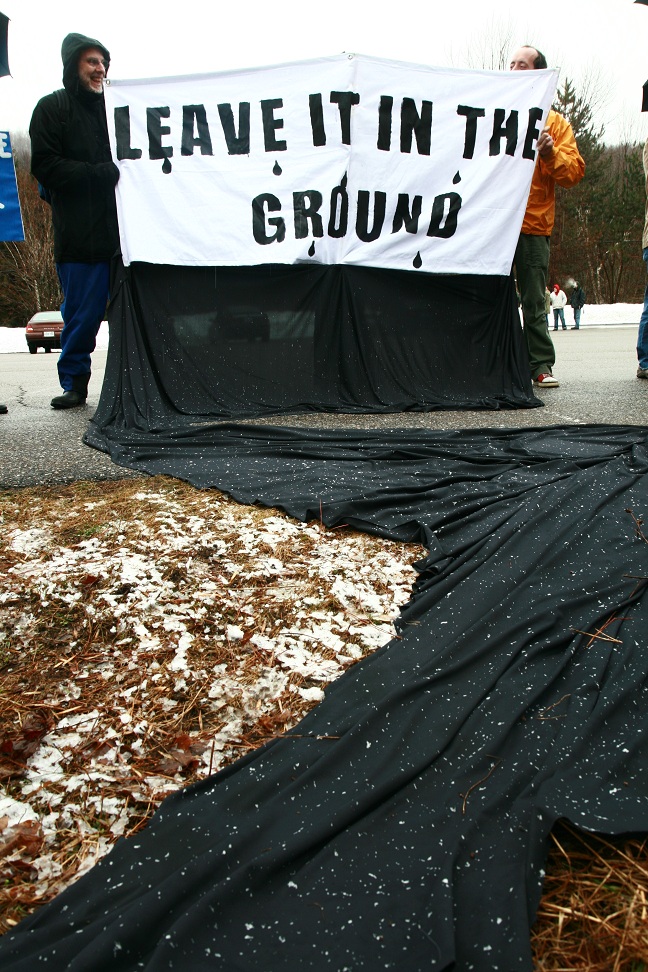The Canada-Newfoundland and Labrador Offshore Petroleum Board has rejected an attempt by Corridor Resources to limit the impact of an environmental assessment process on their license to drill in the Gulf of St Lawrence (you can read the decision here).
A bit of background:
Corridor Resources filed a project description for the drilling of an exploration well on their Old Harry prospect (Exploration Licence 1105) February 22, 2011. Old Harry is a disputed boundary region, straddling Quebec and Newfoundland and Labrador. It has been estimated that Old Harry (see a map here – scroll down) holds up to two billion barrels of recoverable oil – this is twice the size of Hibernia, east of St. John’s N.L. There is also up to 7 trillion cubic feet of natural gas. If tapped, this would be the biggest offshore oil and gas resource in eastern Canada.
Quebec has had a moratorium on oil and gas drilling in the Gulf of St Lawrence and estuary in place since 1998, but this could be in jeopardy upon the completion of a Quebec Strategic Environmental Assessment.
After a significant number of public comments were received, the Canada-Newfoundland and Labrador Offshore Petroleum Board asked the federal government to decide on whether the Gulf should be opened up to drilling. The federal government declined, instead proposing an update to an environmental assessment of the western Newfoundland offshore area including public consultations, and a continuation and completion of a separate screening of the specific project. The Board has indicated it will proceed with public consultations associated with the Environmental Assessment for a drilling program on Corridor Resources exploration licence. The recent decision was spurred by the company’s concern that the consultation would take away time from their exploratory license.
What is at stake:
“Sure, we’re frustrated,” Corridor chief executive Phil Knoll said in an interview. “Is it worth it? Of course it’s worth it. … If there are hydrocarbon Old Harry resources there, the prospect could be very extensive.” (source)
Livelihoods
We are all familiar with the devastation caused by the BP oil spill in the Gulf of Mexico that began April 20, 2010. The impacts of this spill are still very much being felt. The spill spewed more than 4.1 million barrels of crude over 87 days into the Gulf, whose $3 billion fishing industry provides one-third of all seafood consumed in the U.S. As quoted in Reuters, “They destroyed the labor force,” said Louisiana oysterman Terrance M. Shelley, in a Feb, 12 interview. Shelly’s family has 18,000 acres of oyster reefs. “They destroyed the quality of the oysters, and they destroyed the market for Louisiana oysters.” Like New Orleans, Old Harry is surrounded by fisheries rich areas near the shores of Quebec, Newfoundland and Labrador, Nova Scotia, New Brunswick and Prince Edward Island. The question, when it comes to offshore drilling, is not whether there will be a spill, but when, and how much devastation it will wreak. The Gulf of St Lawrence also includes a number of popular tourism destinations – jobs and livelihoods that are at stake if drilling moves ahead.
Ecologically sensitive waters, endangered species
Old Harry also happens to be an ecologically sensitive area. As reported by the St. Lawrence Coalition, there are numerous endangered species that call it home including the Atlantic Cod, Deepwater Redfish, Leatherback Turtle, Fin Whale, Blue Whale, Roseate Tern, Harlequin Duck and more. It is an extremely fragile ecosystem consisting of spawning sites, growth areas and migratory routes for crustaceans, mollusks, fish and marine mammals. Suffice to say, a significant spill in these waters threatens these species and ecosystems.
Canada’s reputation
Canada is increasingly being seen as an eco-outlaw, more interested in becoming an energy superpower than ensuring Canadians energy security needs are met and reducing climate change pollution. Further offshore drilling, like the unsustainable pace of development in the tar sands, is an indicator that we are scrapping the bottom of the barrel, going after increasingly polluting and harder to access, risky resources. Environment Minister Peter Kent’s comments in his August 15 correspondence with CEO of the Canada-Newfoundland and Labrador Offshore Petroleum Board are telling, “I am confident that a screening environmental assessment that will include extensive public consultation can adequately address the issues associated with the project.” (source)
This is the wrong direction. The climate change crisis is real and requires leadership on the part of governments to reduce emissions in a planned, and equitable manner.
The road ahead:
The Council of Canadians supports the call for a moratorium on all projects and requests for permits for offshore drilling in the Gulf of St Lawrence. Unlike Minister Kent, we believe an open, democratic process will allow Atlantic Canadians to have their voices heard, leading to right decision – no offshore drilling.
We have formally joined the St. Lawrence Coalition – visit their website http://www.coalitionsaintlaurent.ca – a coalition of over 60 organizations and 2400 individual members that support a moratorium on oil and gas exploration in the Gulf of St Lawrence. You can read a coalition presentation about oil and gas exploration and exploitation in the Gulf of St. Lawrence here.
Our chapters have already indicated their intention of participating in the public consultation process. You can read a press release issued last April by Atlantic Council of Canadians chapter delegates united in their concern with the proposed drilling of Old Harry.
The Council also submitted written comments to the Canada-Newfoundland and Labrador Offshore Petroleum Board last March expressing our concern that Corridor Resources may be granted a permit to drill (please note: Corridor Resources has an exploratory licence).
We will continue to follow the forthcoming public consultation process and raise awareness of the serious risks of pursuing offshore drilling in the Gulf of St Lawrence.
Andrea Harden-Donahue, energy and climate justice campaigner, The Council of Canadians
www.canadians.org/arctic



